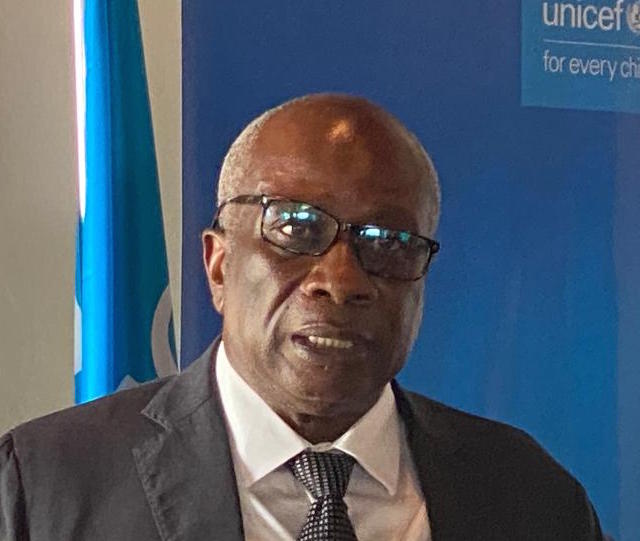|
Getting your Trinity Audio player ready…
|
Ahead of the Day of the African Child (16 June) UNICEF and partners, including football star Marveous Nakamba, singer Selmor Mtukudzi and UNICEF Regional Goodwill Ambassador, rugby star Tendai (the Beast) Mtawarira, made a pledge to promote the role of women in society and to end child marriage. The pledge calls on everyone to become a role model in her or his own community for the empowerment of women and against child marriage.
Child marriage remains widespread in Zimbabwe. One woman out of three was married before the age of 18. To end child marriage the perception of the role of women in society needs to change. Girls need to be given the opportunity to develop their full potential as equal members of society.
At a press event convened by UNICEF Representative Dr. Tajudeen Oyewale, Hon Jennifer Mhlanga, Deputy Minister of Women Affairs, Small and Medium Enterprise Development; Mr. Edward Kallon, UN Resident Coordinator, Ms. Fatou Aminata Lo, UN Women Representative and Dr. Esther Muia, UNPFA Representative met to discuss the issue of child marriage in Zimbabwe calling the media to be active partners in the roll-out of strategies to tackle the issue.
“The Government Of Zimbabwe has put in place institutions, laws and policies that guard against child marriage in the country,” said Deputy Minister of Women’s Affairs, Small and Medium Enterprise Development, Hon. Jennifer Mhlanga. “I’m happy that on 27 May 2022 the President of Zimbabwe signed into law The Marriages Act that prohibits the marriage of minors under the age of 18.”
Child marriage has a devastating impact on the lives of girls. Child marriage disrupts childhood and deprives girls of their right to be a child. It often leads to school drop-out, disallowing girls to develop their full potential, and to early pregnancies when a girl is not mentally and physically ready to birth or take care of a young child. Child marriage deprives girls of their right to acquire appropriate skills to enter the labor force as adults pushing them further into poverty. Child marriage also increases the risk of domestic violence, and psychological and physical violence, including sexual violence, and HIV infections.
“The United Nations in Zimbabwe through the newly adopted United Nations Sustainable Development Framework (2022-2026) promotes interventions to tackle poverty, eliminate Gender-Based Violence and all harmful practices, such as child, early and forced marriage. A number of UN initiatives including the Spotlight Initiative continue to champion the prevention of child marriages in the country,” said United Nations Resident Coordinator, Mr. Edward Kallon
Child marriage not only impacts the individual development of many girls in Zimbabwe. It also has a negative impact on the development of the country. Girls married before completing their education have limited opportunities for employment and their contribution to the economic development of the country is reduced.
“UNICEF is grateful to the partners who responded to our invitation to join hands to increase public awareness on the high percentage of girls being married before 18, and to call on everybody to act against child marriage,” said Dr. Tajudeen Oyewale, UNICEF Representative.
The United Nations applauded the recent adoption of legislation in Zimbabwe and the Constitutional Court judgment, affirming that no child under the age of 18 is legally allowed to marry. While this legislation is important, it is not enough.
“We applaud the recent adoption of legislation setting the legal age for marriage to 18 years. This is a major development that comes as a result of years of evidence-based advocacy and we owe it to the girls of this country to enforce this law so that they can be seen for what they are: girls, not brides, not free labour, not commodities. Girls looking up to us to remove the many obstacles society has put on their pathways,” said UN Women Representative, Ms. Fatou Aminata Lo.
Ending child marriage in Zimbabwe and protecting girls against the consequences of early marriage need more than legislation. It needs behavioral change in the communities. Community leaders, parents and caregivers, elderly men and women, influencers, and children themselves are called to advocate in their communities against child marriage.
The impact of child marriage and its negative health and social empowerment outcomes is not to be underestimated in Zimbabwe. The well-being and the fulfillment of adolescent and young women’s full potential depend on our Joint, cohesive action to eliminate this practice,” said UNFPA Country Representative Dr. Esther Muia. “Everyone can play a role in the Action to end Child Marriage. Policymakers, communities, gatekeepers, religious and traditional leaders, the Media, the private and public sectors, and development, and humanitarian actors. Together we must act to ensure a better future for the future leaders of Zimbabwe.”
UNICEF was joined by Football star Marvelous Nakamba, musician Selmor Mtukudzi, and international Rugby player and UNICEF Regional Goodwill Ambassador Tendai (the Beast) Mtawarira with a call for Zimbabweans to be role models in their community and to stand up and raise their voices in favor of a positive change in the perception of the role of women in society and to support adolescent girls to fulfill their full potential and make their own choices in life.
